2020--2021学年人教版必修五Unit 4 Making the News grammar课件(75张)
文档属性
| 名称 | 2020--2021学年人教版必修五Unit 4 Making the News grammar课件(75张) |
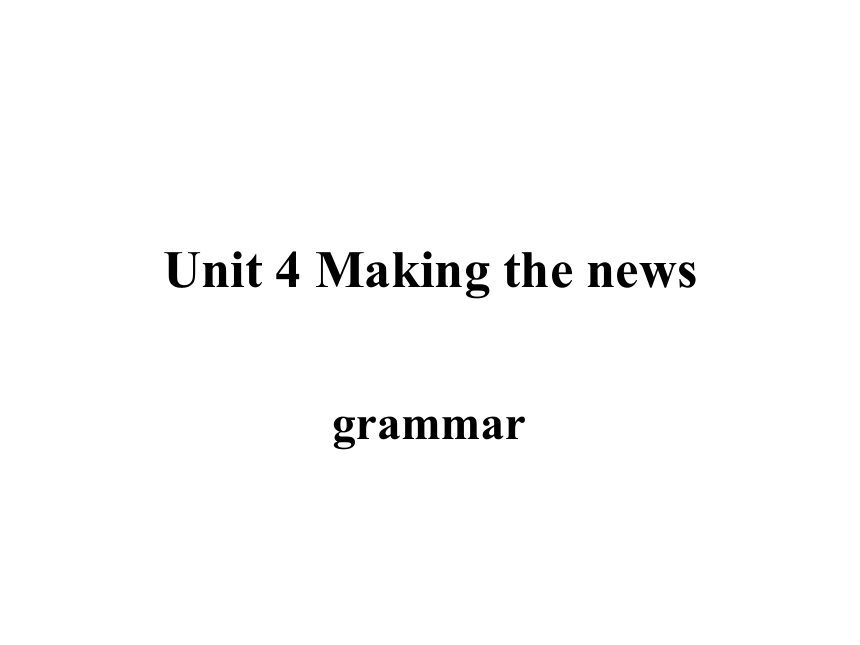
|
|
| 格式 | pptx | ||
| 文件大小 | 867.4KB | ||
| 资源类型 | 教案 | ||
| 版本资源 | 人教版(新课程标准) | ||
| 科目 | 英语 | ||
| 更新时间 | 2021-01-12 07:35:39 | ||
图片预览

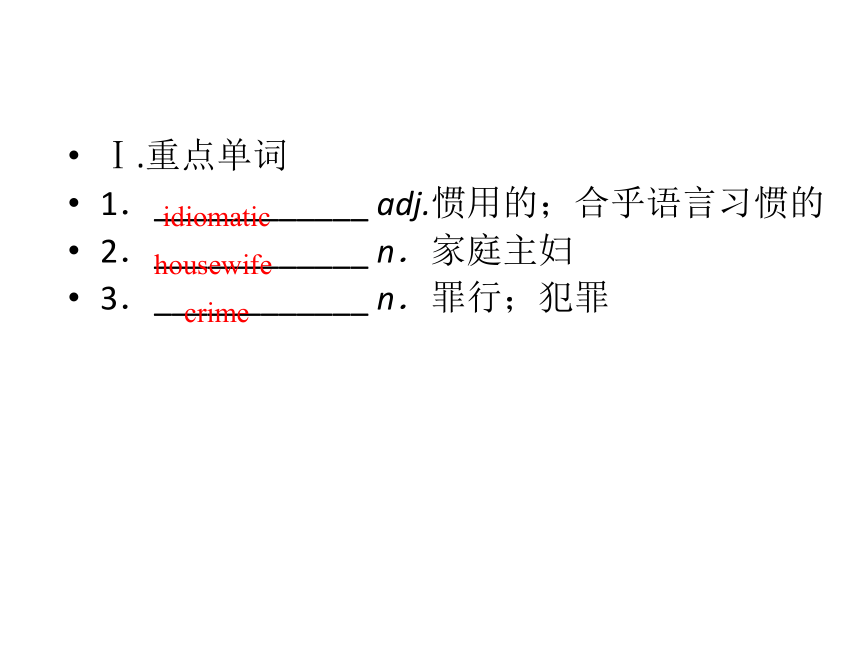
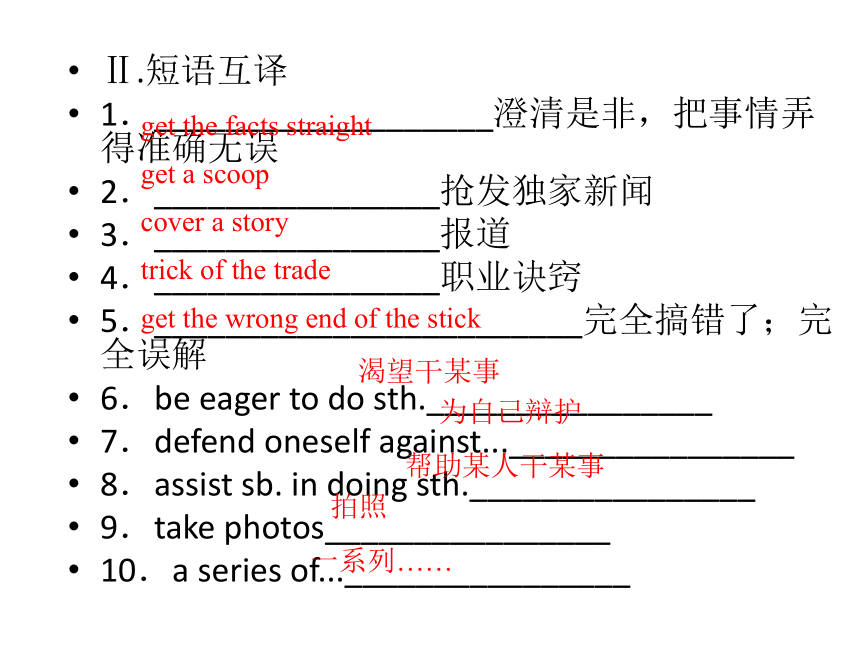
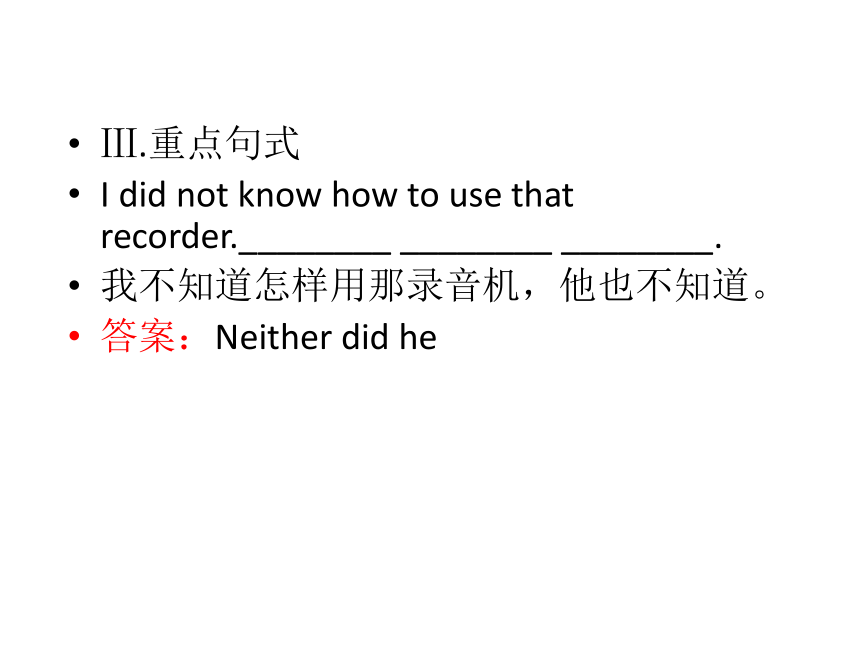
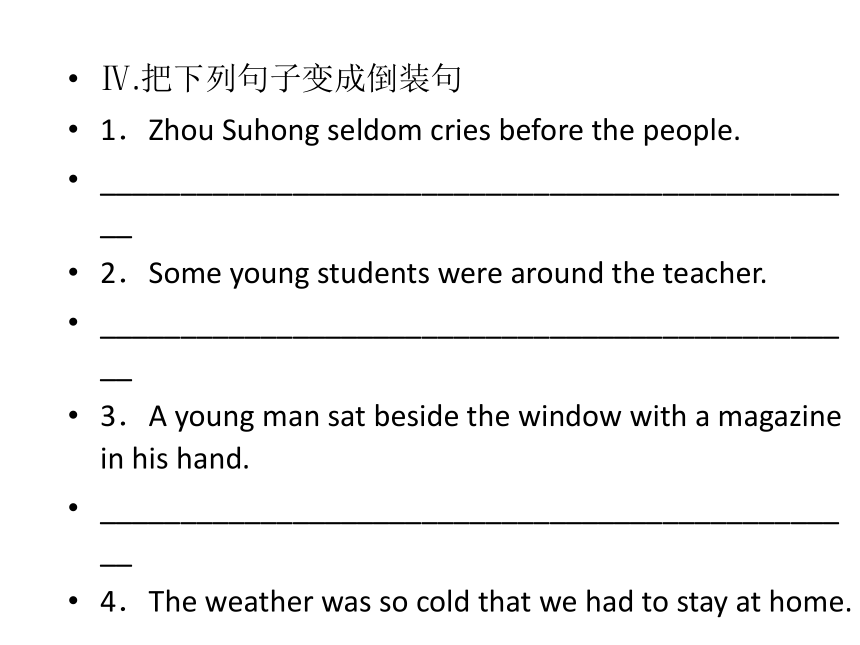
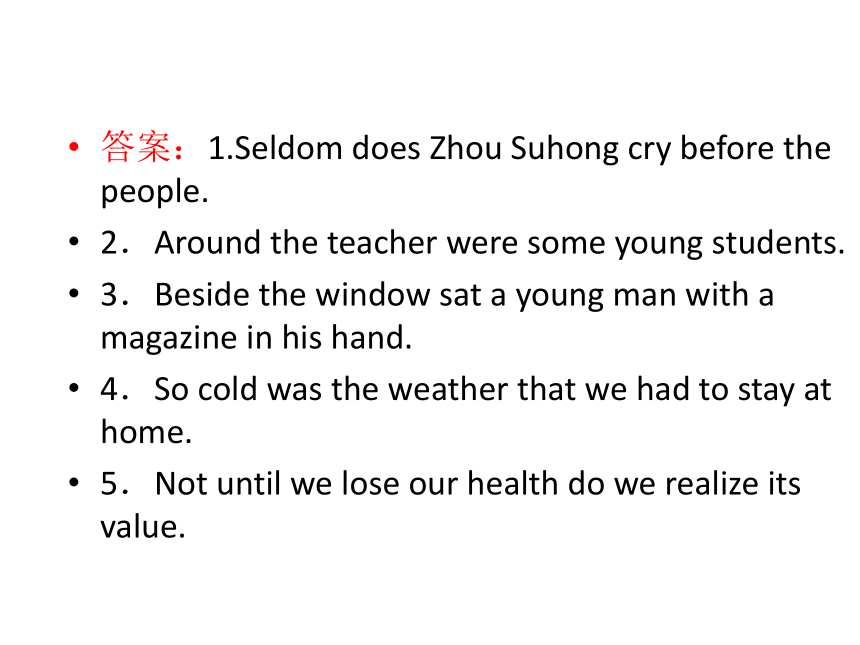
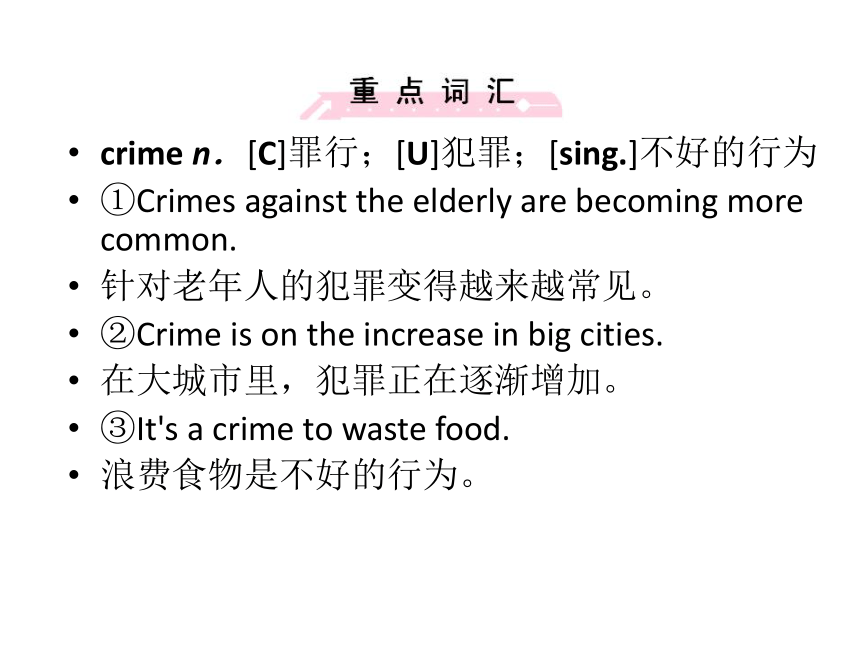

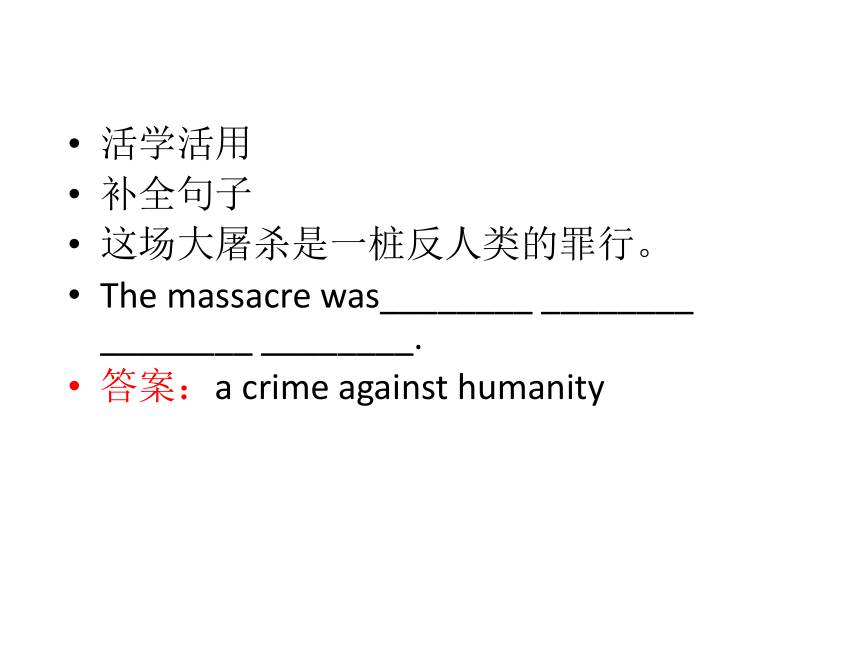
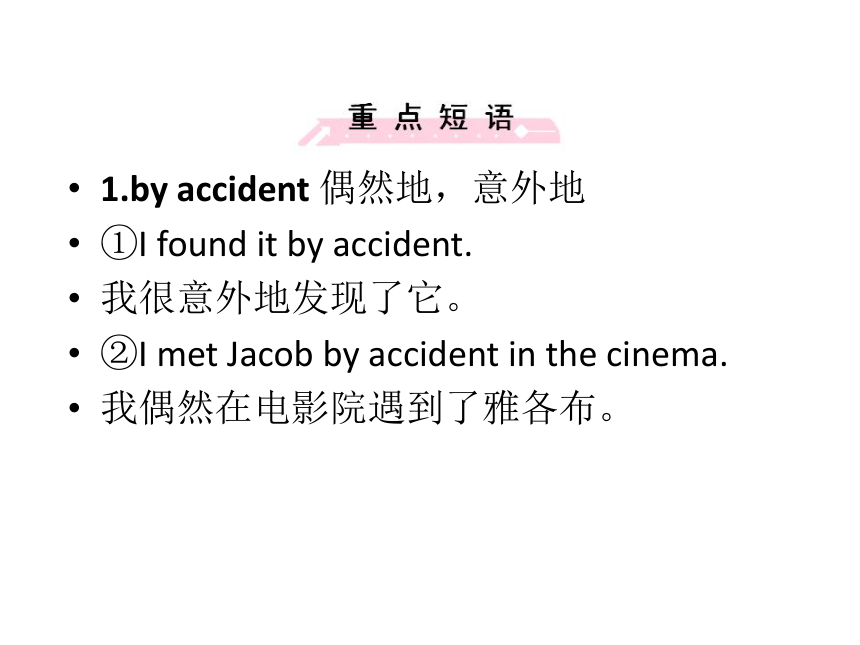
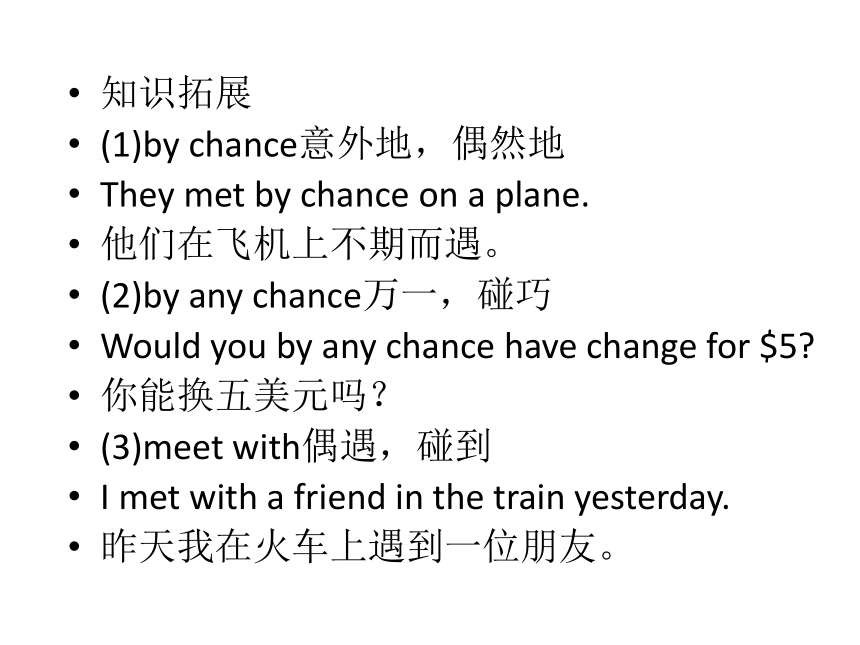
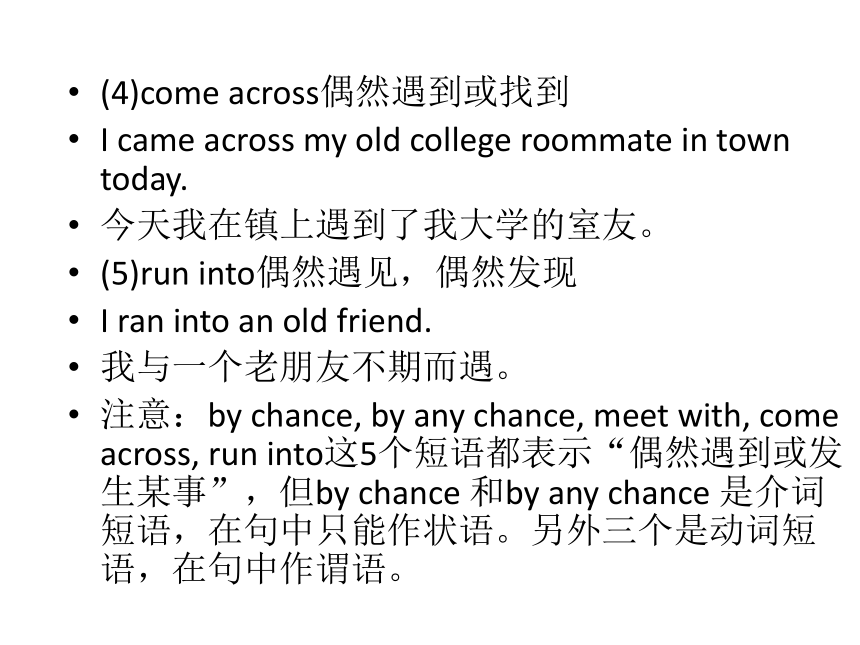
文档简介
Unit 4 Making the news
grammar
Ⅰ.重点单词
1.____________ adj.惯用的;合乎语言习惯的
2.____________ n.家庭主妇
3.____________ n.罪行;犯罪
idiomatic
housewife
crime
Ⅱ.短语互译
1.___________________澄清是非,把事情弄得准确无误
2.________________抢发独家新闻
3.________________报道
4.________________职业诀窍
5.________________________完全搞错了;完全误解
6.be eager to do sth.________________
7.defend oneself against...________________
8.assist sb. in doing sth.________________
9.take photos________________
10.a series of...________________
get the facts straight
get a scoop
cover a story
trick of the trade
get the wrong end of the stick
渴望干某事
为自己辩护
帮助某人干某事
拍照
一系列……
Ⅲ.重点句式
I did not know how to use that recorder.________ ________ ________.
我不知道怎样用那录音机,他也不知道。
答案:Neither did he
Ⅳ.把下列句子变成倒装句
1.Zhou Suhong seldom cries before the people.
________________________________________________
2.Some young students were around the teacher.
________________________________________________
3.A young man sat beside the window with a magazine in his hand.
________________________________________________
4.The weather was so cold that we had to stay at home.
________________________________________________
5.We don't realize its value until we lose our health.
________________________________________________
答案:1.Seldom does Zhou Suhong cry before the people.
2.Around the teacher were some young students.
3.Beside the window sat a young man with a magazine in his hand.
4.So cold was the weather that we had to stay at home.
5.Not until we lose our health do we realize its value.
crime n.[C]罪行;[U]犯罪;[sing.]不好的行为
①Crimes against the elderly are becoming more common.
针对老年人的犯罪变得越来越常见。
②Crime is on the increase in big cities.
在大城市里,犯罪正在逐渐增加。
③It's a crime to waste food.
浪费食物是不好的行为。
criminal n.罪犯 adj.犯罪的,违法的;刑事的,刑法的;不道德的
commit a crime犯罪
知识拓展
活学活用
补全句子
这场大屠杀是一桩反人类的罪行。
The massacre was________ ________ ________ ________.
答案:a crime against humanity
1.by accident 偶然地,意外地
①I found it by accident.
我很意外地发现了它。
②I met Jacob by accident in the cinema.
我偶然在电影院遇到了雅各布。
知识拓展
(1)by chance意外地,偶然地
They met by chance on a plane.
他们在飞机上不期而遇。
(2)by any chance万一,碰巧
Would you by any chance have change for $5?
你能换五美元吗?
(3)meet with偶遇,碰到
I met with a friend in the train yesterday.
昨天我在火车上遇到一位朋友。
(4)come across偶然遇到或找到
I came across my old college roommate in town today.
今天我在镇上遇到了我大学的室友。
(5)run into偶然遇见,偶然发现
I ran into an old friend.
我与一个老朋友不期而遇。
注意:by chance, by any chance, meet with, come across, run into这5个短语都表示“偶然遇到或发生某事”,但by chance 和by any chance 是介词短语,在句中只能作状语。另外三个是动词短语,在句中作谓语。
活学活用
单句改错
He broke the beautiful bowl by the accident.
________________________________________________
答案:去掉第二个the
2.defend sb./sth.(from/against sb./sth.)
(1)防御,保护,保卫(某人/某事物)
①When the dog attacked me, I defended myself with a stick.
那狗扑向我时,我用棍子自卫。
②They had three players defending the goal (against attack).
他们有三个队员防守球门。
(2)辩解,辩白
①The newspaper defended her against the accusations.
报纸为她辩护,驳斥对她的指责。
②You'll need stronger evidence to defend your claim to the inheritance.
你需要更强有力的证据才能为你的遗产继承权进行辩护。
比较网站
defend, protect, guard
这些动词均有“保护、保卫”之意。
(1)defend普通用词,指用武力或其他措施使人或物不受损害,消除危险。用作比喻时,指坚持某种行动、决定或意见;含有采取措施抵制进攻的意思。
She had to defend herself against the guard dog.
她不得不防备看门狗咬她。
(2)protect普通用词,指用某种手段作为防御工具以防危险或伤害;天灾、战争等较大的事情,多用against;较小的事情多用from引出。
He raised his arm to protect his face from the blow.
他抬起胳膊挡住向他脸部打来的一拳。
(3)guard普通用词,指保持警惕以防可能的攻击或伤害。强调警卫,以确保安全。
The dog guarded the house(against strangers).
狗守护着房子(防止陌生人进入)。
活学活用
补全句子
艾滋病是阻止人们抵抗传染和疾病的一种病。
AIDS is a disease that stops a person from ________ ________ ________ infections and illnesses.
答案:defending himself against
I did not know how to use that recorder. Neither did he.
我不知道怎样用那录音机,他也不知道。
本句中Neither did he相当于He didn't know, either。这里是将“neither/nor+be/have/助动词/情态动词+另一主语”用于否定句之后,表示前面所述的否定情况也适用于后者。
Lily can't ride a bike, neither/nor can Lucy.
莉莉不会骑自行车,露西也不会。
He hasn't finished his work, neither/nor have I.
他还没完成工作,我也没完成。
知识拓展
(1)“so+be/have/助动词/情态动词+另一主语”用在肯定句后,表示前面所述的肯定情况也适用于后者。
Mike is good at playing basketball, so is Jack.
迈克擅长打篮球,杰克也擅长。
(2)若上述两种结构前的句子既有实义动词又有情态动词,或既有肯定又有否定的情况,则用It is/was the same with...或So it is/was with...句型。
—He came late for school, but he was not punished.
他上学迟到了,但未受到惩罚。
—So it was with me./It was the same with me.
我也是。
(3)“so+同一主语+be/have/助动词/情态动词”则意为“某人/物的确如此”,表示同意某人的观点。
—Lucy works hard.
露西工作很努力。
—So she does and so do you.
她的确如此,你也是。
活学活用
He didn't go swimming last week,I didn't go either.(用倒装结构改写)
________________________________________________
答案:He didn't go swimming last week,neither did I.
倒装
倒装是英语中常见的一种语言现象。它具有强调、修饰等作用。若把助动词、情态动词放在主语前,则构成部分倒装;若把谓语动词放在主语前,则构成完全倒装。
Ⅰ.完全倒装
完全倒装是指将句子中的谓语动词全部置于主语之前。此结构通常只用于一般现在时或一般过去时。常见的结构有:
1)There be句型:其中be可换成live, lie, stand, remain, exist, come, go, seem(appear/happen/used)to be等表示“存在”的词。
①There entered a strange little man.
走进来一个奇怪而身材又矮小的人。
②Once there lived an old fisherman in a village by the sea.
从前,海边的一个村子里住着一位老渔夫。
2)以here, there, off, out, in, up, down, away, now, then, on等表示方向、位置或时间副词开头的句子,谓语是come, go, be等动词时,并且其主语为名词时,通常使用完全倒装。
①Now, here goes the story.
这个故事是这样的。
②Then came another question.
然后又一个问题被提出来了。
③Away flew the bird.
那鸟飞走了。
④Suddenly, in came a man with a mask on his face.
突然进来一个蒙着面具的人。
3)表示地点的介词短语,常将其放在句首,构成完全倒装,用于强调;注意,此时句子的谓语动词通常是不及物动词,且主语为名词。
①In the cottage lives a family of six.
在这幢小茅舍里住着一家六口。
②Near the bridge was an old cottage.
在桥的附近有一幢古老的小茅舍。
③Next to this one is another grand hotel which is beautifully decorated.
这家饭店隔壁还有一家装修华丽的大饭店。
④On either side of the great avenue stood many block buildings.
这条大街的两侧都耸立着许多综合楼。
4)表语(充当表语的可以是形容词、分词、不定式、介词短语、副词等)置于句首,一般是主语较长或结构为较复杂的句子。
①Gone are the days when he was looked down upon.
他被人瞧不起的日子已经一去不复返了。
②In the armchair lay a cat, half asleep.
一只猫躺在椅子上,半睡半醒。
③Standing around the teacher were her students.
老师周围站着的都是她的学生。
④Also discussed were the problems we had met with in our studies.
同时还讨论了我们在学习中碰到的问题。
⑤First to unfold was the map of the world.
首先要打开的是世界地图。
5)such位于句首。
①Such are the fortunes of war.
这些就是战争的机会。
②Such were his last words.
他最后的话就是这些。
Ⅱ.部分倒装
部分倒装是指将谓语的一部分如助动词或情态动词置于主语之前。如果句中的谓语部分不含有助动词或情态动词时,则需添加助动词do, does或did,并将其置于主语之前。
1)为了避免句子内容出现不必要的重复,常用“so+be动词(助动词、情态动词)+主语”或“neither/nor+be动词(助动词、情态动词)+主语”的倒装句式。其中第一个句式表示“与前面所述的肯定情况相同”,第二个句式表示“与前面所述的否定情况相同”。
①His brother is a college student, so is mine.
他弟弟是大学生,我弟弟也是。
②He used to have his further study abroad, so did I.
他曾去国外深造过,我也去过。
③One of my friends cannot speak foreign languages, neither can his wife.
我的一个朋友不会说外语,他的妻子也不会。
④They are not now preparing for their final examinations, nor are we.
他们没在为期末考试做准备,我们也没有。
2)具有否定意义的词或短语置于句首时(除否定词修饰主语外),句子通常采用部分倒装。这类词或短语常见的有:not, never, seldom, hardly, little, nowhere, rarely, scarcely, by no means, under no circumstances, in no way, at no time, not until..., no sooner...(than), hardly...(when), not only...(but also)。
①Never have my sisters been to Hong Kong before.
我的妹妹们以前从未去过香港。
②So far as I know, seldom does Mary come back to see her mother.
就我所知,玛丽几乎难得回来看她妈妈。
③Nowhere will you find the answer to this question.
无论如何你不会找到这个问题的答案的。
④By no means are these goods satisfactory.
这些货物一点儿也不令人满意。
⑤Not until twelve o'clock did he go to bed last night.
他昨晚直到十二点钟才睡觉。
⑥Not only was the city polluted, but the streets were crowded.
不仅城市被污染,而且街道很拥挤。
⑦No sooner had I returned home from New Zealand than I bought a house and went to live there.
我从新西兰一回国,就买了一栋房子并在那儿住下了。
⑧Hardly could he finish his test paper when the school bell rang.
=When the bell rang, he could hardly finish his test paper.
他还未做完试卷,下课铃就响了。
3)as, though引导的让步状语从句,其中表语、状语等放在as或though之前。注意:as引导的让步状语从句具有以下特点:①表语提前,形容词最高级前的the,单数可数名词前的a/an要省略。②主谓结构的句子,谓语动词(原形)提前时,主语后补出相应的助动词。
①Successful as he is, he is not proud.
尽管他取得了成功,但他并不骄傲。
②Shortest as he is, he is the cleverest of the three.
虽然他是三个人中最矮的,却是最聪明的。
③Child as he is, he knows some of the family secrets.
尽管他还是个孩子,他却知道家里的一些秘密。 (注意child前无冠词)
④Try as I might, I could not lift the stone.
尽管我用尽力气,我还是举不起这块石头。
⑤Too much as/though I like it, I can't afford it.
虽然我非常喜欢它,但是我却买不起。
4)so/such...that...句型中,so/such部分放在句首,该部分须采用部分倒装。
①So serious was the situation that everybody faced a test.
形势如此地严峻,每个人都面临着一场考验。
②So hard did he overwork that he fell ill at last.
他太操劳过度以至于最后病倒了。
③In such a hurry did she leave that she forgot to lock the door.
她匆匆离去,以至于忘记了锁门。
5)句首以were, had, should开头,省略if的虚拟语气条件句。
①Had they not helped us, we could not have done it so successfully.
如果没有他们的帮助,我们不可能把那件事办的如此成功。
②Should he come, say “Nobody in” to him.
万一他来了,对他说:“公司没人。”
③Were I you,I would go with them.
我要是你的话,我就跟他们一起去。
6)only与副词、介词短语及状语从句连用放在句首时。
①Only in this way can you come up with a solution to the problem.
只有这样,你才有可能想出解决这个问题的办法。
②Only after being asked three times did he come to the meeting.
叫了三次之后,他才来参加会议。
③Only when he is seriously ill does he ever stay in bed.
只有当病得很重时,他才卧床休息。
7)频度副词及短语。如:often, always, once, many a time, now and then, every other day等位于句首时。
①Many a time has he given me good advice.
他多次给我忠告。
②Often have I seen these Young Pioneers do good deeds.
我经常看到这些少先队员做好事。
8)表祝愿的句子常用倒装。
①May our friendship last forever!
愿我们的友谊长存!
②May your company become prosperous!
祝贵公司生意兴隆!
③Long live the great, glorious and correct the Communist Party of China!
伟大、光荣、正确的中国共产党万岁!
9)某些感叹句也用倒装语序。
①Isn't it a beautiful garden!
多么美丽的花园啊!
②Have you ever seen such a naughty kid like him!
你见过哪个孩子像他这么调皮!
知识拓展
1)在以there, here, up, down, out, in等副词开头的句子中,主语是代词时,句子不倒装。
There they are.
他们在那边。
2)only修饰主语,句子不倒装。
Only Mary knows the answer.
只有玛丽知道答案。
3)表示赞同某人的看法时,用So+S.+do/does/did.
—I told you that I would come.
—我告诉过你我会来的。
—So you did.
—你确实说过。
4)not until后接从句时,主句部分倒装,从句不倒装;no sooner...than, hardly...when, not only...but also引导两个分句时,前一分句部分倒装,后一分句不倒装,这种结构常用过去完成时。但在neither...nor结构中,前后两个分句均要倒装。
①Not only did he complain about the food, but also refused to pay for it.
他不仅抱怨饭菜的质量,而且拒不付款。
②Hardly had he finished his speech when the audience started cheering.
他刚演讲完观众便欢呼起来。
③No sooner had she gone out than a student came to visit her.
她刚出门,就有个学生来访。
④Neither do I know her name, nor does he.
我不知道她的名字,他也不知道。
巧学助记
部分倒装口诀:
副词开头要倒装,人称代词非如常;only修饰副介状,位于句首半倒装;否定意义副连词,位于句首须倒装;表语前置主语长,衔接自然常倒装;such代词作表语,引起主谓要倒装;not only开头句,前一分句须倒装;had, were, should虚拟句,省略if半倒装。
高考真题改编
用倒装结构完成句子
1.No sooner ________Mo Yan stepped on the stage than the audience broke into thunderous applause.
答案:had 考查倒装。句意:莫言刚踏上舞台,观众就爆发出了雷鸣般的掌声。no sooner... than...一……就……,no sooner位于句首时,应进行部分倒装,且动作发生在掌声爆发之前,故用过去完成时。
2.Not only________ the nurses want a pay increase, they want reduced hours as well.
答案:do 考查倒装句。句意:护士不但想要加薪,她们还要求减少工作时间。
3.Only when you can find peace in your heart ________you keep good relationships with others.
答案:will 考查特殊句式。only所修饰的状语位于句首时,主句用部分倒装句,即将主句谓语中的助动词、系动词或情态动词提到主句的主语前,根据从句可知主句用一般将来时。
4.________ by increasing the number of doctors by 50 percent can the patients be treated properly in this hospital.
答案:Only 考查倒装句。句意:只有通过增加百分之五十的医生,在医院里才能合理地给病人治病。“Only+状语”置于句首时,主句用部分倒装语序,故填only。
5.At no time ________they actually break the rules of the game.It was unfair to punish them.
答案:did 考查特殊句式的用法。句意:他们实际上没有违反比赛的规则,处罚他们是不公平的。at no time“从不,绝不”,是否定副词,位于句首时,句子用部分倒装结构。由第二句中的was可知应填did。
6.“Never for a second,”the boy says, “________I doubt that my father would come to my rescue.”
答案:did 考查倒装。句意:“我从没怀疑,”男孩说,“父亲会来救我”。never“从不”,表示否定意义的副词位于句首,句子用部分倒装语序。又是叙述过去的事情,故用一般过去时。
7.Not once ________it occur to Michael that he could one day become a top student in his class.
答案:did 考查倒装语序。句意:麦克怎么也没想到他有一天会成为班里的尖子生。否定副词(Not once)位于句首时,句子采用部分倒装语序。
8.Not until he went through real hardship ________ he realize the love we have for our families is important.
答案:did 考查not until的倒装语序。not until置于句首,使用部分倒装语序;realize动作与went同时发生,故填did。
9.Only when he apologizes for his rudeness ________ I speak to him again.
答案:will 考查倒装和时态。句意:只有当他为他的粗鲁道歉时,我才会和他说话。“Only+状语”位于句首,句子采用部分倒装语序,when时间状语从句采用一般现在时表将来,主句用一般将来时态,所以填will。
10.The headmaster will not permit the change in the course, nor ________he even give it a thought.
答案:will nor“也不”,表示否定的词位于句首,句子用部分倒装;根据前后时态一致原则,填will。句意:校长不会允许课程的改变,他甚至不会给予考虑。
专项练习
1.Only when the chief editor comes________ it be possible to settle the problem.
答案:will 句意:只有主编来了,才有可能解决这个问题。“Only+状语”放在句首时,主句需要部分倒装,但要注意作状语的从句(即状语从句)不能倒装。
2.Great________ the difficulty was the mountain climbers eventually conquered Mountain Qomolangma.
答案:as/though 句意:虽然困难重重,但是这些登山者最终征服了珠穆朗玛峰。“形容词、副词、名词甚至是动词+as/though+主语+谓语”放在主句前面,相当于though/ although引导的状语从句。本句中Great as the difficulty was=Although/Though the difficulty was great。
3.—It's burning hot today, isn't it?
—Yes.________was it yesterday.
答案:So 句意:“—今天热极了,对吗?”“—是的,昨天也这么热。”表达前后两天的天气情况相同,采用“so+助动词/情态动词等+(另一个)主语”。
4.The child tiptoed quietly to the bird.Away it________ (fly)into the forest when he was about to catch it.
答案:flew 句意:这个孩子蹑手蹑脚地走向小鸟,当他就要捉住小鸟时,它一下子飞进了森林。副词away用于句首,如果主语是名词,则用倒装结构;如果主语是代词,则用正常语序;此处主语是代词it,不需要倒装。
5.Try ________ she might, Sue couldn't get the door open.
答案:as 句意:尽管苏尝试了,但她还是打不开门。根据句子结构可知,本题考查as引导的让步状语从句,要用倒装语序。其结构为:动词/名词/形容词/副词+as+主语+谓语,填as。
6.Never in my wildest dreams________I imagine these people are living in such poor conditions.
答案:could 句意:我连做梦都不会想到这些人会生活在如此贫穷的环境中。因为否定词never位于句首,故用倒装结构。
7.We laugh at jokes, but seldom ________ we think about how they work.
答案:do 句意:我们会对一些玩笑大笑不止,但是却很少去考虑一下这些玩笑说明了什么。否定副词seldom位于句首时,句子要用部分倒装,由laugh可知应用一般现在时。
8.Just in front of our house________(stand)a tall tree with a history of 1,000 years.
答案:stands 表示地点的介词短语,常将其放在句首,构成全部倒装,用于强调;注意,此时句子的谓语动词通常是不及物动词且主语为名词。
9.________curious were the couple about wild plants that they decided to make a trip to Madagascar for further research.
答案:So 考查so/such...that句型的倒装句式。主句倒装, that从句主谓不倒装。
10.Mary never does any reading in the evening,________ does John(约翰也不).
答案:nor 本题考查连词nor引导的倒装句,neither/nor+情态动词或助动词+主语。该结构表示前边所说的情况也同样适合于后者。
11.—Well, I do think the rabbit is a beautiful, gentle animal which can run very fast.
—So________ ________.
答案:it is 句意:“—嗯,我的确认为兔子是一种美丽,温顺,奔跑速度快的动物。”“—是的。”“So+主语(与前句的主语一致)+助动词、情态动词”等,表示“赞同”,译作“……的确如此”。
12.In the dark forests________(lie) many lakes, some large enough to hold several English towns.
答案:lie 句意:湖泊位于黑暗的森林中。表示地点的介词短语,常将其放在句首,构成全部倒装,用于强调;注意,此时句子的谓语动词通常是不及物动词。此外,lie=to occupy a position or place表示“(城镇、自然特征等)位于,坐落于(一个位置或地方)”。
13.On top of the books________the photo album you're looking for.
答案:is 表示地点的介词短语,常将其放在句首,构成全部倒装,用于强调;注意,此时句子的谓语动词通常是不及物动词。此外,句子的主语为the photo album,根据主谓一致原则,填is。
14.So little________ they agree with each other that the neighboring countries could not settle their difference.
答案:did so/such...that...句型中,“so/such+adj./adv”部分放在句首,该部分须部分倒装。
practice
Ⅰ.单词拼写
1.You should ________(帮助,协助)Mr. Smith in preparing a report.
2.In that________(情形,状况), I would prefer to stay on the bus.
3.The police________(指控)him of murder.
4.I don't ________(赞成)of wasting time.
5.He often reads the ________(标题)at the first sight on getting the newspaper.
答案:1.assist 2.case 3.accused 4.approve 5.headlines
答案:1.BD 2.DA 3.DB 4.CB 5.CA
grammar
Ⅰ.重点单词
1.____________ adj.惯用的;合乎语言习惯的
2.____________ n.家庭主妇
3.____________ n.罪行;犯罪
idiomatic
housewife
crime
Ⅱ.短语互译
1.___________________澄清是非,把事情弄得准确无误
2.________________抢发独家新闻
3.________________报道
4.________________职业诀窍
5.________________________完全搞错了;完全误解
6.be eager to do sth.________________
7.defend oneself against...________________
8.assist sb. in doing sth.________________
9.take photos________________
10.a series of...________________
get the facts straight
get a scoop
cover a story
trick of the trade
get the wrong end of the stick
渴望干某事
为自己辩护
帮助某人干某事
拍照
一系列……
Ⅲ.重点句式
I did not know how to use that recorder.________ ________ ________.
我不知道怎样用那录音机,他也不知道。
答案:Neither did he
Ⅳ.把下列句子变成倒装句
1.Zhou Suhong seldom cries before the people.
________________________________________________
2.Some young students were around the teacher.
________________________________________________
3.A young man sat beside the window with a magazine in his hand.
________________________________________________
4.The weather was so cold that we had to stay at home.
________________________________________________
5.We don't realize its value until we lose our health.
________________________________________________
答案:1.Seldom does Zhou Suhong cry before the people.
2.Around the teacher were some young students.
3.Beside the window sat a young man with a magazine in his hand.
4.So cold was the weather that we had to stay at home.
5.Not until we lose our health do we realize its value.
crime n.[C]罪行;[U]犯罪;[sing.]不好的行为
①Crimes against the elderly are becoming more common.
针对老年人的犯罪变得越来越常见。
②Crime is on the increase in big cities.
在大城市里,犯罪正在逐渐增加。
③It's a crime to waste food.
浪费食物是不好的行为。
criminal n.罪犯 adj.犯罪的,违法的;刑事的,刑法的;不道德的
commit a crime犯罪
知识拓展
活学活用
补全句子
这场大屠杀是一桩反人类的罪行。
The massacre was________ ________ ________ ________.
答案:a crime against humanity
1.by accident 偶然地,意外地
①I found it by accident.
我很意外地发现了它。
②I met Jacob by accident in the cinema.
我偶然在电影院遇到了雅各布。
知识拓展
(1)by chance意外地,偶然地
They met by chance on a plane.
他们在飞机上不期而遇。
(2)by any chance万一,碰巧
Would you by any chance have change for $5?
你能换五美元吗?
(3)meet with偶遇,碰到
I met with a friend in the train yesterday.
昨天我在火车上遇到一位朋友。
(4)come across偶然遇到或找到
I came across my old college roommate in town today.
今天我在镇上遇到了我大学的室友。
(5)run into偶然遇见,偶然发现
I ran into an old friend.
我与一个老朋友不期而遇。
注意:by chance, by any chance, meet with, come across, run into这5个短语都表示“偶然遇到或发生某事”,但by chance 和by any chance 是介词短语,在句中只能作状语。另外三个是动词短语,在句中作谓语。
活学活用
单句改错
He broke the beautiful bowl by the accident.
________________________________________________
答案:去掉第二个the
2.defend sb./sth.(from/against sb./sth.)
(1)防御,保护,保卫(某人/某事物)
①When the dog attacked me, I defended myself with a stick.
那狗扑向我时,我用棍子自卫。
②They had three players defending the goal (against attack).
他们有三个队员防守球门。
(2)辩解,辩白
①The newspaper defended her against the accusations.
报纸为她辩护,驳斥对她的指责。
②You'll need stronger evidence to defend your claim to the inheritance.
你需要更强有力的证据才能为你的遗产继承权进行辩护。
比较网站
defend, protect, guard
这些动词均有“保护、保卫”之意。
(1)defend普通用词,指用武力或其他措施使人或物不受损害,消除危险。用作比喻时,指坚持某种行动、决定或意见;含有采取措施抵制进攻的意思。
She had to defend herself against the guard dog.
她不得不防备看门狗咬她。
(2)protect普通用词,指用某种手段作为防御工具以防危险或伤害;天灾、战争等较大的事情,多用against;较小的事情多用from引出。
He raised his arm to protect his face from the blow.
他抬起胳膊挡住向他脸部打来的一拳。
(3)guard普通用词,指保持警惕以防可能的攻击或伤害。强调警卫,以确保安全。
The dog guarded the house(against strangers).
狗守护着房子(防止陌生人进入)。
活学活用
补全句子
艾滋病是阻止人们抵抗传染和疾病的一种病。
AIDS is a disease that stops a person from ________ ________ ________ infections and illnesses.
答案:defending himself against
I did not know how to use that recorder. Neither did he.
我不知道怎样用那录音机,他也不知道。
本句中Neither did he相当于He didn't know, either。这里是将“neither/nor+be/have/助动词/情态动词+另一主语”用于否定句之后,表示前面所述的否定情况也适用于后者。
Lily can't ride a bike, neither/nor can Lucy.
莉莉不会骑自行车,露西也不会。
He hasn't finished his work, neither/nor have I.
他还没完成工作,我也没完成。
知识拓展
(1)“so+be/have/助动词/情态动词+另一主语”用在肯定句后,表示前面所述的肯定情况也适用于后者。
Mike is good at playing basketball, so is Jack.
迈克擅长打篮球,杰克也擅长。
(2)若上述两种结构前的句子既有实义动词又有情态动词,或既有肯定又有否定的情况,则用It is/was the same with...或So it is/was with...句型。
—He came late for school, but he was not punished.
他上学迟到了,但未受到惩罚。
—So it was with me./It was the same with me.
我也是。
(3)“so+同一主语+be/have/助动词/情态动词”则意为“某人/物的确如此”,表示同意某人的观点。
—Lucy works hard.
露西工作很努力。
—So she does and so do you.
她的确如此,你也是。
活学活用
He didn't go swimming last week,I didn't go either.(用倒装结构改写)
________________________________________________
答案:He didn't go swimming last week,neither did I.
倒装
倒装是英语中常见的一种语言现象。它具有强调、修饰等作用。若把助动词、情态动词放在主语前,则构成部分倒装;若把谓语动词放在主语前,则构成完全倒装。
Ⅰ.完全倒装
完全倒装是指将句子中的谓语动词全部置于主语之前。此结构通常只用于一般现在时或一般过去时。常见的结构有:
1)There be句型:其中be可换成live, lie, stand, remain, exist, come, go, seem(appear/happen/used)to be等表示“存在”的词。
①There entered a strange little man.
走进来一个奇怪而身材又矮小的人。
②Once there lived an old fisherman in a village by the sea.
从前,海边的一个村子里住着一位老渔夫。
2)以here, there, off, out, in, up, down, away, now, then, on等表示方向、位置或时间副词开头的句子,谓语是come, go, be等动词时,并且其主语为名词时,通常使用完全倒装。
①Now, here goes the story.
这个故事是这样的。
②Then came another question.
然后又一个问题被提出来了。
③Away flew the bird.
那鸟飞走了。
④Suddenly, in came a man with a mask on his face.
突然进来一个蒙着面具的人。
3)表示地点的介词短语,常将其放在句首,构成完全倒装,用于强调;注意,此时句子的谓语动词通常是不及物动词,且主语为名词。
①In the cottage lives a family of six.
在这幢小茅舍里住着一家六口。
②Near the bridge was an old cottage.
在桥的附近有一幢古老的小茅舍。
③Next to this one is another grand hotel which is beautifully decorated.
这家饭店隔壁还有一家装修华丽的大饭店。
④On either side of the great avenue stood many block buildings.
这条大街的两侧都耸立着许多综合楼。
4)表语(充当表语的可以是形容词、分词、不定式、介词短语、副词等)置于句首,一般是主语较长或结构为较复杂的句子。
①Gone are the days when he was looked down upon.
他被人瞧不起的日子已经一去不复返了。
②In the armchair lay a cat, half asleep.
一只猫躺在椅子上,半睡半醒。
③Standing around the teacher were her students.
老师周围站着的都是她的学生。
④Also discussed were the problems we had met with in our studies.
同时还讨论了我们在学习中碰到的问题。
⑤First to unfold was the map of the world.
首先要打开的是世界地图。
5)such位于句首。
①Such are the fortunes of war.
这些就是战争的机会。
②Such were his last words.
他最后的话就是这些。
Ⅱ.部分倒装
部分倒装是指将谓语的一部分如助动词或情态动词置于主语之前。如果句中的谓语部分不含有助动词或情态动词时,则需添加助动词do, does或did,并将其置于主语之前。
1)为了避免句子内容出现不必要的重复,常用“so+be动词(助动词、情态动词)+主语”或“neither/nor+be动词(助动词、情态动词)+主语”的倒装句式。其中第一个句式表示“与前面所述的肯定情况相同”,第二个句式表示“与前面所述的否定情况相同”。
①His brother is a college student, so is mine.
他弟弟是大学生,我弟弟也是。
②He used to have his further study abroad, so did I.
他曾去国外深造过,我也去过。
③One of my friends cannot speak foreign languages, neither can his wife.
我的一个朋友不会说外语,他的妻子也不会。
④They are not now preparing for their final examinations, nor are we.
他们没在为期末考试做准备,我们也没有。
2)具有否定意义的词或短语置于句首时(除否定词修饰主语外),句子通常采用部分倒装。这类词或短语常见的有:not, never, seldom, hardly, little, nowhere, rarely, scarcely, by no means, under no circumstances, in no way, at no time, not until..., no sooner...(than), hardly...(when), not only...(but also)。
①Never have my sisters been to Hong Kong before.
我的妹妹们以前从未去过香港。
②So far as I know, seldom does Mary come back to see her mother.
就我所知,玛丽几乎难得回来看她妈妈。
③Nowhere will you find the answer to this question.
无论如何你不会找到这个问题的答案的。
④By no means are these goods satisfactory.
这些货物一点儿也不令人满意。
⑤Not until twelve o'clock did he go to bed last night.
他昨晚直到十二点钟才睡觉。
⑥Not only was the city polluted, but the streets were crowded.
不仅城市被污染,而且街道很拥挤。
⑦No sooner had I returned home from New Zealand than I bought a house and went to live there.
我从新西兰一回国,就买了一栋房子并在那儿住下了。
⑧Hardly could he finish his test paper when the school bell rang.
=When the bell rang, he could hardly finish his test paper.
他还未做完试卷,下课铃就响了。
3)as, though引导的让步状语从句,其中表语、状语等放在as或though之前。注意:as引导的让步状语从句具有以下特点:①表语提前,形容词最高级前的the,单数可数名词前的a/an要省略。②主谓结构的句子,谓语动词(原形)提前时,主语后补出相应的助动词。
①Successful as he is, he is not proud.
尽管他取得了成功,但他并不骄傲。
②Shortest as he is, he is the cleverest of the three.
虽然他是三个人中最矮的,却是最聪明的。
③Child as he is, he knows some of the family secrets.
尽管他还是个孩子,他却知道家里的一些秘密。 (注意child前无冠词)
④Try as I might, I could not lift the stone.
尽管我用尽力气,我还是举不起这块石头。
⑤Too much as/though I like it, I can't afford it.
虽然我非常喜欢它,但是我却买不起。
4)so/such...that...句型中,so/such部分放在句首,该部分须采用部分倒装。
①So serious was the situation that everybody faced a test.
形势如此地严峻,每个人都面临着一场考验。
②So hard did he overwork that he fell ill at last.
他太操劳过度以至于最后病倒了。
③In such a hurry did she leave that she forgot to lock the door.
她匆匆离去,以至于忘记了锁门。
5)句首以were, had, should开头,省略if的虚拟语气条件句。
①Had they not helped us, we could not have done it so successfully.
如果没有他们的帮助,我们不可能把那件事办的如此成功。
②Should he come, say “Nobody in” to him.
万一他来了,对他说:“公司没人。”
③Were I you,I would go with them.
我要是你的话,我就跟他们一起去。
6)only与副词、介词短语及状语从句连用放在句首时。
①Only in this way can you come up with a solution to the problem.
只有这样,你才有可能想出解决这个问题的办法。
②Only after being asked three times did he come to the meeting.
叫了三次之后,他才来参加会议。
③Only when he is seriously ill does he ever stay in bed.
只有当病得很重时,他才卧床休息。
7)频度副词及短语。如:often, always, once, many a time, now and then, every other day等位于句首时。
①Many a time has he given me good advice.
他多次给我忠告。
②Often have I seen these Young Pioneers do good deeds.
我经常看到这些少先队员做好事。
8)表祝愿的句子常用倒装。
①May our friendship last forever!
愿我们的友谊长存!
②May your company become prosperous!
祝贵公司生意兴隆!
③Long live the great, glorious and correct the Communist Party of China!
伟大、光荣、正确的中国共产党万岁!
9)某些感叹句也用倒装语序。
①Isn't it a beautiful garden!
多么美丽的花园啊!
②Have you ever seen such a naughty kid like him!
你见过哪个孩子像他这么调皮!
知识拓展
1)在以there, here, up, down, out, in等副词开头的句子中,主语是代词时,句子不倒装。
There they are.
他们在那边。
2)only修饰主语,句子不倒装。
Only Mary knows the answer.
只有玛丽知道答案。
3)表示赞同某人的看法时,用So+S.+do/does/did.
—I told you that I would come.
—我告诉过你我会来的。
—So you did.
—你确实说过。
4)not until后接从句时,主句部分倒装,从句不倒装;no sooner...than, hardly...when, not only...but also引导两个分句时,前一分句部分倒装,后一分句不倒装,这种结构常用过去完成时。但在neither...nor结构中,前后两个分句均要倒装。
①Not only did he complain about the food, but also refused to pay for it.
他不仅抱怨饭菜的质量,而且拒不付款。
②Hardly had he finished his speech when the audience started cheering.
他刚演讲完观众便欢呼起来。
③No sooner had she gone out than a student came to visit her.
她刚出门,就有个学生来访。
④Neither do I know her name, nor does he.
我不知道她的名字,他也不知道。
巧学助记
部分倒装口诀:
副词开头要倒装,人称代词非如常;only修饰副介状,位于句首半倒装;否定意义副连词,位于句首须倒装;表语前置主语长,衔接自然常倒装;such代词作表语,引起主谓要倒装;not only开头句,前一分句须倒装;had, were, should虚拟句,省略if半倒装。
高考真题改编
用倒装结构完成句子
1.No sooner ________Mo Yan stepped on the stage than the audience broke into thunderous applause.
答案:had 考查倒装。句意:莫言刚踏上舞台,观众就爆发出了雷鸣般的掌声。no sooner... than...一……就……,no sooner位于句首时,应进行部分倒装,且动作发生在掌声爆发之前,故用过去完成时。
2.Not only________ the nurses want a pay increase, they want reduced hours as well.
答案:do 考查倒装句。句意:护士不但想要加薪,她们还要求减少工作时间。
3.Only when you can find peace in your heart ________you keep good relationships with others.
答案:will 考查特殊句式。only所修饰的状语位于句首时,主句用部分倒装句,即将主句谓语中的助动词、系动词或情态动词提到主句的主语前,根据从句可知主句用一般将来时。
4.________ by increasing the number of doctors by 50 percent can the patients be treated properly in this hospital.
答案:Only 考查倒装句。句意:只有通过增加百分之五十的医生,在医院里才能合理地给病人治病。“Only+状语”置于句首时,主句用部分倒装语序,故填only。
5.At no time ________they actually break the rules of the game.It was unfair to punish them.
答案:did 考查特殊句式的用法。句意:他们实际上没有违反比赛的规则,处罚他们是不公平的。at no time“从不,绝不”,是否定副词,位于句首时,句子用部分倒装结构。由第二句中的was可知应填did。
6.“Never for a second,”the boy says, “________I doubt that my father would come to my rescue.”
答案:did 考查倒装。句意:“我从没怀疑,”男孩说,“父亲会来救我”。never“从不”,表示否定意义的副词位于句首,句子用部分倒装语序。又是叙述过去的事情,故用一般过去时。
7.Not once ________it occur to Michael that he could one day become a top student in his class.
答案:did 考查倒装语序。句意:麦克怎么也没想到他有一天会成为班里的尖子生。否定副词(Not once)位于句首时,句子采用部分倒装语序。
8.Not until he went through real hardship ________ he realize the love we have for our families is important.
答案:did 考查not until的倒装语序。not until置于句首,使用部分倒装语序;realize动作与went同时发生,故填did。
9.Only when he apologizes for his rudeness ________ I speak to him again.
答案:will 考查倒装和时态。句意:只有当他为他的粗鲁道歉时,我才会和他说话。“Only+状语”位于句首,句子采用部分倒装语序,when时间状语从句采用一般现在时表将来,主句用一般将来时态,所以填will。
10.The headmaster will not permit the change in the course, nor ________he even give it a thought.
答案:will nor“也不”,表示否定的词位于句首,句子用部分倒装;根据前后时态一致原则,填will。句意:校长不会允许课程的改变,他甚至不会给予考虑。
专项练习
1.Only when the chief editor comes________ it be possible to settle the problem.
答案:will 句意:只有主编来了,才有可能解决这个问题。“Only+状语”放在句首时,主句需要部分倒装,但要注意作状语的从句(即状语从句)不能倒装。
2.Great________ the difficulty was the mountain climbers eventually conquered Mountain Qomolangma.
答案:as/though 句意:虽然困难重重,但是这些登山者最终征服了珠穆朗玛峰。“形容词、副词、名词甚至是动词+as/though+主语+谓语”放在主句前面,相当于though/ although引导的状语从句。本句中Great as the difficulty was=Although/Though the difficulty was great。
3.—It's burning hot today, isn't it?
—Yes.________was it yesterday.
答案:So 句意:“—今天热极了,对吗?”“—是的,昨天也这么热。”表达前后两天的天气情况相同,采用“so+助动词/情态动词等+(另一个)主语”。
4.The child tiptoed quietly to the bird.Away it________ (fly)into the forest when he was about to catch it.
答案:flew 句意:这个孩子蹑手蹑脚地走向小鸟,当他就要捉住小鸟时,它一下子飞进了森林。副词away用于句首,如果主语是名词,则用倒装结构;如果主语是代词,则用正常语序;此处主语是代词it,不需要倒装。
5.Try ________ she might, Sue couldn't get the door open.
答案:as 句意:尽管苏尝试了,但她还是打不开门。根据句子结构可知,本题考查as引导的让步状语从句,要用倒装语序。其结构为:动词/名词/形容词/副词+as+主语+谓语,填as。
6.Never in my wildest dreams________I imagine these people are living in such poor conditions.
答案:could 句意:我连做梦都不会想到这些人会生活在如此贫穷的环境中。因为否定词never位于句首,故用倒装结构。
7.We laugh at jokes, but seldom ________ we think about how they work.
答案:do 句意:我们会对一些玩笑大笑不止,但是却很少去考虑一下这些玩笑说明了什么。否定副词seldom位于句首时,句子要用部分倒装,由laugh可知应用一般现在时。
8.Just in front of our house________(stand)a tall tree with a history of 1,000 years.
答案:stands 表示地点的介词短语,常将其放在句首,构成全部倒装,用于强调;注意,此时句子的谓语动词通常是不及物动词且主语为名词。
9.________curious were the couple about wild plants that they decided to make a trip to Madagascar for further research.
答案:So 考查so/such...that句型的倒装句式。主句倒装, that从句主谓不倒装。
10.Mary never does any reading in the evening,________ does John(约翰也不).
答案:nor 本题考查连词nor引导的倒装句,neither/nor+情态动词或助动词+主语。该结构表示前边所说的情况也同样适合于后者。
11.—Well, I do think the rabbit is a beautiful, gentle animal which can run very fast.
—So________ ________.
答案:it is 句意:“—嗯,我的确认为兔子是一种美丽,温顺,奔跑速度快的动物。”“—是的。”“So+主语(与前句的主语一致)+助动词、情态动词”等,表示“赞同”,译作“……的确如此”。
12.In the dark forests________(lie) many lakes, some large enough to hold several English towns.
答案:lie 句意:湖泊位于黑暗的森林中。表示地点的介词短语,常将其放在句首,构成全部倒装,用于强调;注意,此时句子的谓语动词通常是不及物动词。此外,lie=to occupy a position or place表示“(城镇、自然特征等)位于,坐落于(一个位置或地方)”。
13.On top of the books________the photo album you're looking for.
答案:is 表示地点的介词短语,常将其放在句首,构成全部倒装,用于强调;注意,此时句子的谓语动词通常是不及物动词。此外,句子的主语为the photo album,根据主谓一致原则,填is。
14.So little________ they agree with each other that the neighboring countries could not settle their difference.
答案:did so/such...that...句型中,“so/such+adj./adv”部分放在句首,该部分须部分倒装。
practice
Ⅰ.单词拼写
1.You should ________(帮助,协助)Mr. Smith in preparing a report.
2.In that________(情形,状况), I would prefer to stay on the bus.
3.The police________(指控)him of murder.
4.I don't ________(赞成)of wasting time.
5.He often reads the ________(标题)at the first sight on getting the newspaper.
答案:1.assist 2.case 3.accused 4.approve 5.headlines
答案:1.BD 2.DA 3.DB 4.CB 5.CA
